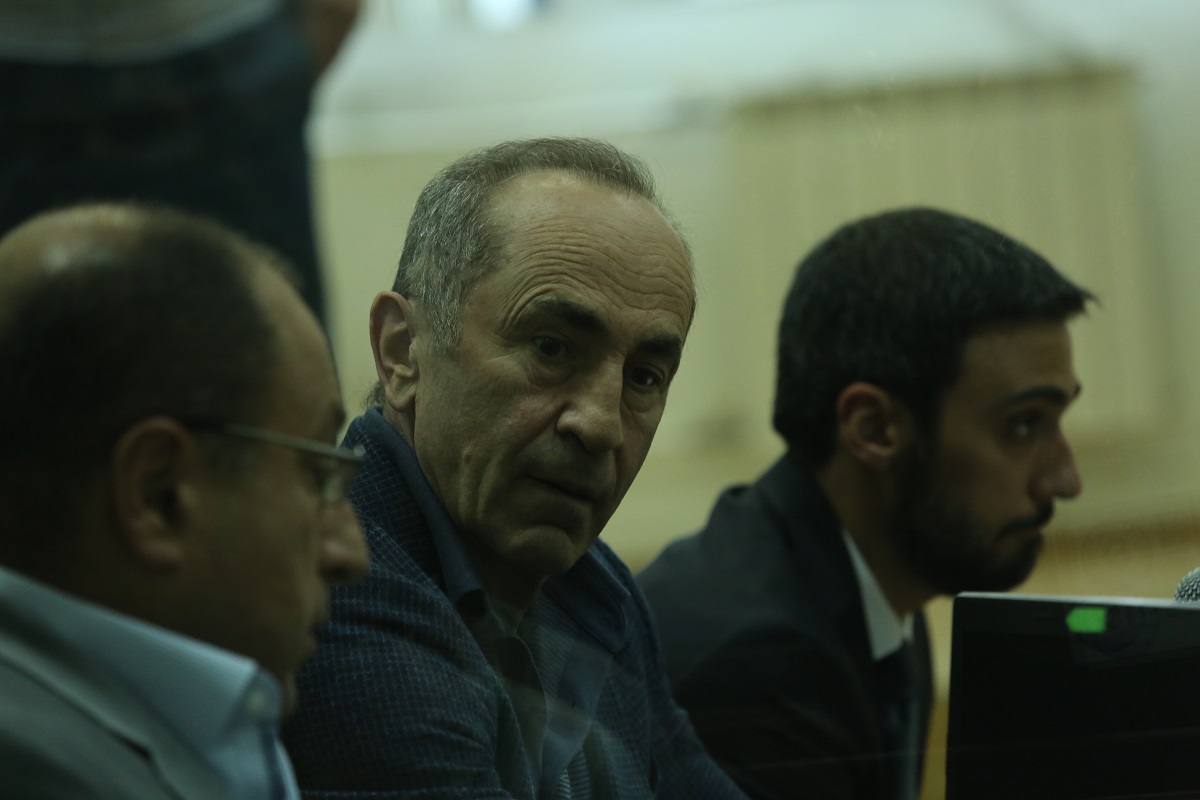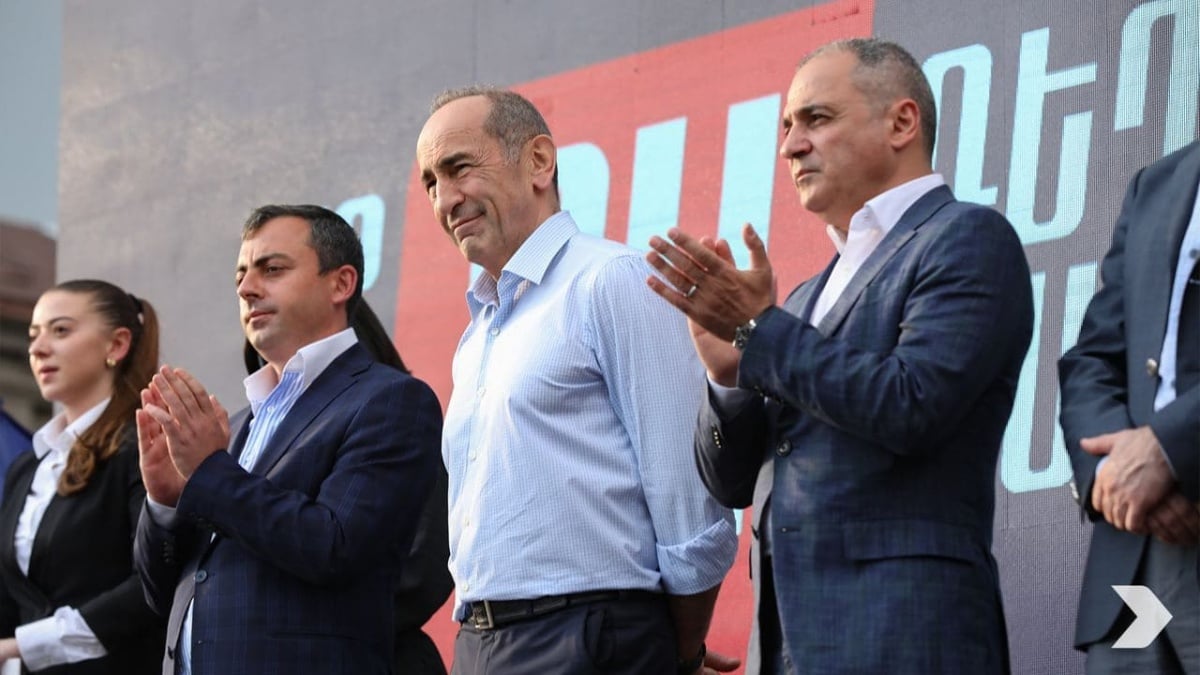“The March 1 case has not been removed from the political agenda of Armenia” - Pashinyan
Pashinyan on the March 1 case
“The March 1 case has been solved, but the perpetrators have not been punished for a variety of reasons, including due to a number of legal decisions,” the Prime Minister of Armenia said at the opening of a monument dedicated to the victims of the tragic events of 2008.
During the dispersal of a demonstration of those who disagreed with the results of the elections in 2008, ten people were killed. Since taking office in 2018, Nikol Pashinyan has stated that everything will be done to disclose all the circumstances of the events of March 1. Now he again vows that this issue has not been removed from the political agenda.
After the presidential election held on February 19, 2008, mass protests began in Armenia. The first president of Armenia, Levon Ter-Petrosyan, who was one of the candidates, and his supporters, including at that time oppositionist Nikol Pashinyan, did not accept the election result. The CEC announced that Serzh Sargsyan had won. Permanent protests began, their participants also set up tents on Freedom Square in the center of Yerevan.
On March 1, 2008, the police began to clear protesters from the square where they had spent the night, then the operation to disperse demonstrators took place throughout the city. On the square adjacent to the monument to Alexander Myasnikyan there were clashes between demonstrators and security forces. ten people were killed, including two policemen, and hundreds were injured. Not one murder has been solved fifteen years later.
- Are former defense ministers being persecuted in Armenia? Opinion of opposition and expert
- “Azerbaijan is at a dead end” – Speaker of the Armenian Parliament on the blockade of NK
- “The EU mission in Armenia is not directed against anyone” – Toivo Klaar

The monument was erected in the square not far from the place where the tragic events took place. The artist is Albert Vardanyan, who was also a participant in the 2008 protests.
The opening ceremony was attended by the Prime Minister of Armenia, the President and Speaker of the Parliament, politicians and relatives of the March 1 victims. Representatives of the Armenian National Congress, which led the 2008 protests, did not attend the event. The founder and leader of the ANC is former president Levon Ter-Petrosyan.
“Pashinyan failed the case of bringing criminals to justice”
A few hours before the unveiling of the monument, the Armenian National Congress criticized both the prime minister and the sculpture. ANC deputy head Levon Zurabyan called the monument “an incomprehensible example of abstract sculpture.” In a Facebook post, he also criticized the inscription on the monument “In memory of the victims of March 1.” In his opinion, “nothing is clear” from this inscription. Zurabyan believes that the following inscription should have been attached to the monument:
“On March 1, 2008, for the first time in the history of the newly independent Armenian state, the authorities opened fire on peaceful demonstrators fighting for democracy, killing ten people. The monument is dedicated to the citizens who fought for democracy and to the memory of all the victims of this crime.”
As for the prime minister, Levon Zurabyan accused him of failing to prosecute the perpetrators in the March 1 case:
“Moreover, Pashinyan legitimized them as a convenient parliamentary opposition [ex-presidents Robert Kocharyan and Serzh Sargsyan]. And the construction of such an absurd, meaningless, indistinct “monument” is just another manifestation of this policy.”
“Only the names of the perpetrators are unknown”
After the opening ceremony of the monument, journalists asked Pashinyan if he still believes that the March 1 case has been solved, to which he replied that they know where the orders came from, and only the perpetrators are unknown.
Five years ago, Nikol Pashinyan stated that “the March 1 case has, in fact, been completely solved,” but so far only one former police officer has been accused of murder.
“We must not forget … illegal payments were made, this happened under the auspices of the army. The main perpetrators were on trial, but under certain circumstances they … [were not convicted],” the prime minister said.
He added that he did not want to comment on “legal decisions that are not subject to appeal”, referring to the court’s decision regarding former Armenian President Robert Kocharyan. He was declared the main defendant in the case, but the court did not find him guilty.
Kocharyan was arrested in July 2018. The investigation into the events of 2008 was resumed after the “velvet revolution”, when the team of Nikol Pashinyan came to power. During the trial, Kocharyan was released several times and returned to the prison cell again.
However, in April 2021, the court finally acquitted Robert Kocharyan, who was accused of overthrowing the constitutional order. The criminal prosecution against the former president was terminated, as the Constitutional Court of Armenia recognized article 300.1 of the criminal code, under which he was charged, as inconsistent with the constitution.
Pashinyan recalled that the criminal case had been closed:
“It has been proven that the preliminary investigation, which was conducted immediately after March 1, 2008, not only did not make efforts to solve the crime, but also made every possible effort to make it difficult or impossible to solve it. The fact that the killers of March 1 have not yet been found does not mean that this will not happen. My position is that we must achieve full disclosure. This issue has not been removed from our agenda,” he declared.
“March 1 is evidence of the absence of democracy”
According to the Prime Minister of Armenia, March 1 is not a day of mourning at all. He says that “the command of life and struggle of our fallen brothers is about something else”:
“The events of March 1 occurred from the lack or absence of democracy, a violation, deformation of the free will of the people, depriving them of the opportunity to express and make decisions. And that is how we should perceive the meaning of March 1st.”
In the 2008 presidential election, Nikol Pashinyan represented presidential candidate Levon Ter-Petrosyan [Armenia’s first president resigned in 1998 and ran again in 2008]. After the tragic events of March 1, Pashinyan went underground for a year and four months due to accusations of organizing mass riots. On July 1, 2010, he voluntarily appeared at the prosecutor’s office, was arrested and sentenced to seven years. One year and 11 months later, he was granted an amnesty timed to coincide with the 20th anniversary of Armenia’s independence.
According to Pashinyan the struggle of 2008 was not in vain, because “the falsification of elections in Armenia from now on is history, to which there will be no return.”
“And the guarantor of this is not any government, party or power, but the people of Armenia,” he said.
Follow us – Twitter | Facebook | Instagram
Pashinyan on the March 1 case




















